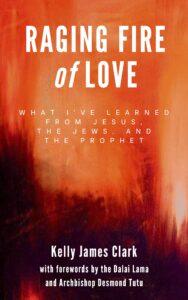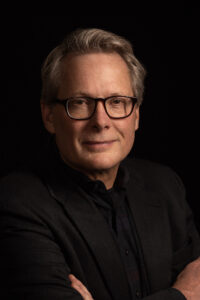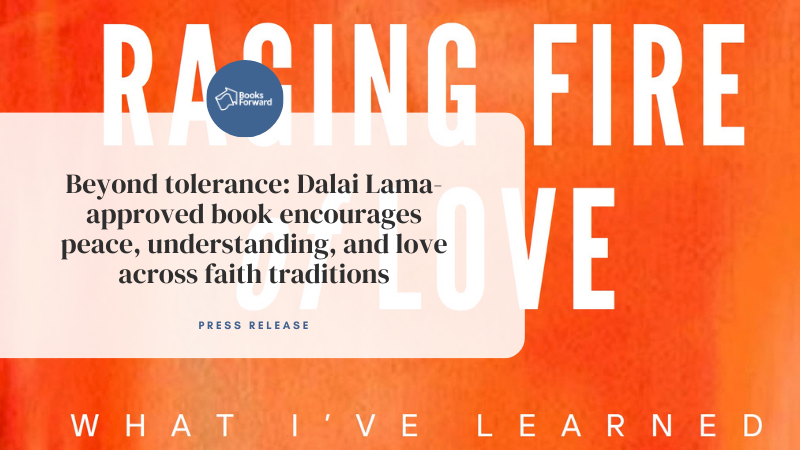“In ‘Raging Fire of Love,’ Dr. Kelly James Clark delves into the teachings of Judaism, Christianity and Islam, and concludes that kindness and compassion lie at the heart of them all.”
–His Holiness, the Dalai Lama
 GRAND RAPIDS, MI–In his accessible and inspirational collection of religious insights, “Raging Fire of Love” (May 14, 2024), acclaimed scholar Dr. Kelly James Clark examines the texts of Christianity, Judaism, and Islam, searching for teachings of diversity and love. Finding that the similarities that bind us together are far greater than the differences that threaten to divide us, Clark documents valuable lessons to help readers build bridges of understanding between faiths.
GRAND RAPIDS, MI–In his accessible and inspirational collection of religious insights, “Raging Fire of Love” (May 14, 2024), acclaimed scholar Dr. Kelly James Clark examines the texts of Christianity, Judaism, and Islam, searching for teachings of diversity and love. Finding that the similarities that bind us together are far greater than the differences that threaten to divide us, Clark documents valuable lessons to help readers build bridges of understanding between faiths.
Writing about compassion in the Abrahamic traditions with the New Testament, the Hebrew Bible, and the Quran as his guides, Clark provides enlightening anecdotes gleaned from conversations with his friends—Kirk, Jim, Nancy, Mary Ann and Ted; Aaron, Silvia, Samuel, Shira, and Shlomit; and Abdullah, Ghazala, Asif, Zahabia, and Mohammed. Through these interfaith conversations, Clark finds kernels of wisdom that will motivate readers to move beyond tolerance and toward acceptance and love of others.
“Raging Fire of Love: What I’ve Learned from Jesus, the Jews, and the Prophet”
Kelly James Clark | May 14, 2024 | Self-Published | Nonfiction, Memoir, Spirituality
Ebook | ASIN: B0CW1SBZZC | $2.99
“I am grateful for Clark’s informative and inspirational call to the children of Abraham, to all of God’s children really, to resist our divisive fears and to bravely and hopefully persist in love.”
–Archbishop Desmond Tutu, 1931-2021
About the author…
 KELLY JAMES CLARK, PHD: is Distinguished Professor of Philosophy at Ibn Haldun University in Istanbul. He earned his PhD in Philosophy at the University of Notre Dame in 1985. He has taught at Gordon College, Calvin College, the University of Notre Dame, and the University of St. Andrews; he has held visiting appointments at Oxford University, Peking University, and Wuhan University. He has authored over 100 articles and written, co-authored or edited over 30 books, including most relevantly, Strangers, Neighbors, Friends: Muslim-Christian-Jewish Reflections on Compassion and Peace; Written to be Heard: Recovering the Lost Messages of the Gospels; God and the Brain; and Abraham’s Children: Liberty and Tolerance in an Age of Religious Conflict. He is also executive producer of the feature film, “The Manifestation.” Learn more at his website: https://kellyjamesclark.wixsite.com/kellyjamesclark
KELLY JAMES CLARK, PHD: is Distinguished Professor of Philosophy at Ibn Haldun University in Istanbul. He earned his PhD in Philosophy at the University of Notre Dame in 1985. He has taught at Gordon College, Calvin College, the University of Notre Dame, and the University of St. Andrews; he has held visiting appointments at Oxford University, Peking University, and Wuhan University. He has authored over 100 articles and written, co-authored or edited over 30 books, including most relevantly, Strangers, Neighbors, Friends: Muslim-Christian-Jewish Reflections on Compassion and Peace; Written to be Heard: Recovering the Lost Messages of the Gospels; God and the Brain; and Abraham’s Children: Liberty and Tolerance in an Age of Religious Conflict. He is also executive producer of the feature film, “The Manifestation.” Learn more at his website: https://kellyjamesclark.wixsite.com/kellyjamesclark
In an interview, Kelly James Clark can discuss:
- Why “Raging Fire of Love” is important for today’s contemporary climate
- What the New Testament, the Hebrew Bible, and the Quran teach about love
- What these religious texts teach regarding diversity and acceptance
- Where religious prejudice stems from, and how to overcome implicit bias
- Steps readers can take to bridge the gap between faiths and move toward a more peaceful world
An Interview with
Kelly James Clark
1. What do Judaism, Christianity and Islam teach about love?
Jesus, a Jew, located himself within the Jewish tradition of love-grounded justice and peace revealed by God to Moses; the Quran, affirming both the Mosaic Law and the Gospel of Jesus, sees the reduction of pride (the diminishing of the incessant ego) as necessary for acts of compassion, kindness, and justice. Despite some surface differences, each of the three Abrahamic traditions affirms the grounding of and motivation for justice and peace in the love of God and love of neighbor as one loves oneself. And while all three traditions commend love for your near-neighbor, it’s usually easy to love within your tribe. So all three extend “neighbor” to include those you might fear–the stranger and even the enemy; such distant-neighbor-love is risky business.
2. How do these three religions endorse diversity and acceptance of others?
The Books of Love—the Hebrew Bible, the New Testament and the Quran—call us to be compassionate, patient, generous, and forgiving toward all of our neighbors, near or distant; they envision a radically inclusive world in which everyone lives together and in peace. They ground the honor and respect of all people, in spite of their surface differences, in humanity’s creation in the image of God. Finally, what God loves–all of humanity–we should love, too.
3. Where does religious prejudice stem from and how can we work to overcome implicit bias?
We naturally divide people into in-groups and out-groups. Children learn from their elders who and what are in and who and what are out. When they do, fear and love take on a life of their own. The in-group becomes the locus of all that is good: family, friend, trust, cooperation, and compassion; the out-group becomes the locus of all that is bad: threat, enemy, fear, competition, and hate. The most effective way to overcome our biases against members of other religions and cultures is to meet the “other” and listen (and begin to care).
4. Is understanding other religious practices the first step toward finding acceptance and love for one’s neighbor?
The first step toward finding acceptance and love for one’s very different neighbor is almost always meeting them and listening to them. I have never met Judaism or Islam, I have, however, met and gotten to know many Jews and Muslims. As I will repeat—we don’t meet theologies, we meet people. And meeting people is vastly more transformative than reading about an idea. In “Raging Fire of Love,” you will meet some of the friends who transformed me. I think, through them, you will learn, as I did, a great deal about Judaism and Islam.
5. What do you hope readers will take away from “Raging Fire of Love”?
This book aims to inspire and inform readers about their own and other traditions. The former will serve to mobilize members of a tradition to appropriate all of its resources to
transform their fears into love. The latter will serve to decrease fear and suspicion through a better understanding of those in other traditions. As we become increasingly nationalist, isolationist, and tribal, we need to find ways to inspire the love that conquers fear.

A former award-winning journalist with national exposure, Marissa now oversees the day-to-day operation of the Books Forward author branding and book marketing firm, along with our indie publishing support sister company Books Fluent.
Born and bred in Louisiana, currently living in New Orleans, she has lived and developed a strong base for our company and authors in Chicago and Nashville. Her journalism work has appeared in USA Today, National Geographic and other major publications. She is now interviewed by media on best practices for book marketing.


